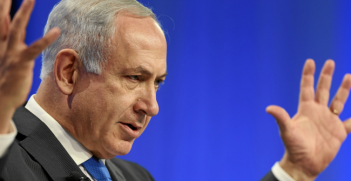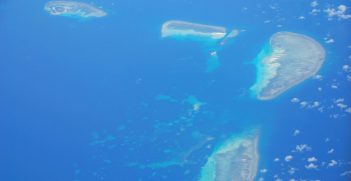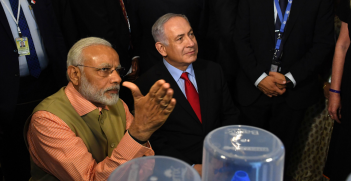UN Secretary-General: The Race So Far

One of the certainties over who will be the next United Nations secretary-general is that it will not be Kevin Rudd. Despite the perception that the most likely victor would be an Eastern European woman, two rounds of straw voting in which candidates are “encouraged” or “discouraged” by members of the Security Council have seen an unexpected frontrunner emerge. And with the final decision anticipated in October, candidates and regional blocs are in full campaign mode.
Too many seem to believe it is Eastern Europe’s turn to lead the UN. That geopolitical sub-regional identity became obsolete with the end of the Cold War. Both Bulgaria (Irina Bokova) and Slovenia (Danilo Turk) are members of the European Union and the Council of Europe. It suits them and Russia to claim it’s Eastern Europe’s turn. The two rounds of informal polling in the Security Council on 21 July and 5 August prove this is not widely accepted.
There is more general acceptance it is Europe’s turn, hence the unexpected front-runner status of Antonio Guterres, Portugal’s former prime minister. But this poses two complications.
The first complication is that three Europeans have been secretary-general for 25 years, two Asians for 20 years, two Africans for 15 years, and one Latin American for 10 years; thus Latin America, not Europe, has the best continental claim on the job now.
The second complication is that Canada, Australia and New Zealand form the CANZ subgroup within Europe. As they have never held the post, their claim is no less legitimate than Eastern Europe’s—although they do not have a Russia to defend their claim with a veto.
In 2006, the UN General Assembly introduced gender as a selection criterion. Bokova is backed by Russia and could be vetoed by the US for that reason and also because UNESCO, which she heads, has not been hostile enough to the Palestinians for Washington’s taste.
The person with the biggest gains from round one to two of the polling was Argentina’s Foreign Minister Susanna Malcorra, a former UN under-secretary-general and reputedly Washington’s favourite. But Britain harbours doubts based on the historical dispute over the Falkland Islands. However, if the Latin Americans combine behind her and push both regional and gender criteria, she could come through.
Conversely, New Zealand’s Helen Clark fared worse than expected in the first round and slipped further in the second. She is distrusted by many of her UN Development Programme staff and is clearly not held in as high esteem in the UN community as the English-language media believed.
The straw polls have sent everyone from Macedonia’s Srgjan Kerim down (including Clark) a strong signal that the Security Council majority wants them to withdraw. This also proves the unpredictability of the process and the risks of second-guessing the outcome to pre-emptively terminate someone’s candidacy.
Closer to home, the big confusion has been the failure to distinguish between nominating an Australian and choosing the best person to lead the UN. Only the latter requires an assessment of suitability. Because governments cannot know other candidates as well as their own, they cannot competitively evaluate everyone with equal objectivity. Moreover, the the prime minister and Cabinet—which, Julie Bishop excepted, is mostly ignorant about and in some cases quite hostile to the UN—cannot but inject, and be seen to inject, the poison of partisanship into any effort to evaluate the suitability of a former prime minister of the rival party.
In fact Australia does not have a vote in choosing the next secretary-general. That choice will be a judgment on the quality of UN leadership. Malcolm Turnbull was merely being asked to nominate Rudd so his name could go into the mix along with the other 12 candidates. His decision is an unflattering reflection on the quality of Australian democracy and the civility of its political discourse.
This is the only time in the UN’s 70-year history that a credible Australian was in contention. Nor was Rudd facing a challenge from another Australian candidate. Our next opportunity might come after 40 years, if the UN still exists (doubtful).
Any former prime minister is a distinguished Australian. The only criterion for Turnbull—who is well short of the clear majority that elected Rudd—should have been if Rudd’s candidacy was credible. The only body to assess this accurately and objectively is DFAT whose answer was a clear “yes”.
If former prime ministers, regardless of my strong personal dislike of some, were interested in high international office and their candidacy was judged credible by DFAT, I would be incensed at any government that kneecapped them.
Wrongly or rightly, Rudd continues to command significant international respect for his past role in tackling the global financial crisis, birthing the G20, highlighting the threat of climate change and the apology to Indigenous Australians. He remains engaged in trying to improve multilateral institutions and navigate China-US relations.
Had Rudd been nominated but badly humiliated, his political enemies could have enjoyed their schadenfreude yet been seen as hard-headed but big-hearted. Instead they have proven to be small-minded, mean-spirited and petty. Given Rudd’s global stature, that will damage Australia’s and Turnbull’s international reputation while heightening Turnbull’s challenge to secure Labor cooperation in a fractious parliament.
At some stage the Security Council will introduce coloured ballots for permanent members, allowing it be determined if a candidate is being discouraged by one of the members with a veto or not. Guterres is the only one to cross the required threshold of nine votes for recommendation to the General Assembly. If neither of the two discouragements he has received is from a permanent member, he will likely be the next secretary-general. If he is vetoed, they will have to reopen the selection process to a wider field and Rudd could conceivably still sneak in, unlikely as that seems. Another Bulgarian waiting in the wings, with broad European support, is Kristalina Georgieva, presently a European Commissioner.
It has to be said that the two rounds so far are a slap in the face both to the general UN membership of 193 countries, and to global civil society, whose demands for a woman secretary-general have been brushed aside. Yet it serves the General Assembly right for lacking the backbone to take control of the process—as constitutionally it can—by demanding an equal role with the Security Council. For example, it could insist on a slate of three candidates on whom the Assembly would vote for a final choice whenever the Security Council agrees on its recommendation.
| Encourage | Discourage | No opinion | |
| Antonio Guterres | 11(12) | 2(0) | 2(3) |
| Vuc Jeremic | 8(9) | 4(5) | 3(1) |
| Susanna Malcorra | 8(7) | 6(4) | 1(4) |
| Danilo Turk | 7(11) | 5(2) | 3(2) |
| Irina Bokova | 7(9) | 7(4) | 1(2) |
| Srgjan Kerim | 6(9) | 7(5) | 2(1) |
| Helen Clark | 6(8) | 8(5) | 1(2) |
| Miroslav Lajcak | 2(7) | 6(3) | 7(5) |
| Christiana Figuerres | 5(5) | 8(5) | 2(5) |
| Natalia Gherman | 3(4) | 10(4) | 2(7) |
| Igor Luksic | 2(3) | 9(7) | 4(5) |
Professor Ramesh Thakur is director of the Centre for Nuclear Non-Proliferation and Disarmament in the Crawford School of Public Policy at the Australian National University. This article is published under a Creative Commons Licence and can be republished with attribution.





